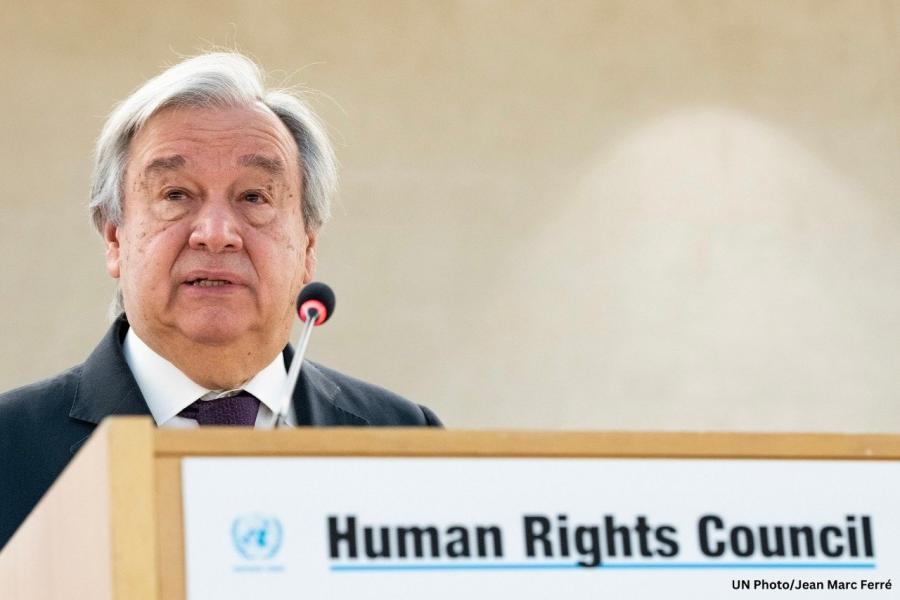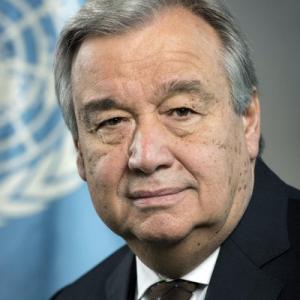UN Secretary-General's remarks to the 52nd session of the Human Rights Council
27 February 2023

Excellencies, ladies and gentlemen,
The Universal Declaration of Human Rights was adopted 75 years ago.
The Declaration described, for the first time, entitlements that apply to everyone, everywhere, always.
The most translated document in the world, its English version is just 1300 words long.
But all human life is there.
The Universal Declaration sets out the rights to life, liberty and security; to equality before the law; to freedom of expression; to seek asylum; to work, to healthcare and education, and more.
But as we mark its 75th anniversary, the Universal Declaration is under assault from all sides.
The Russian invasion of Ukraine has triggered the most massive violations of human rights we are living today.
It has unleashed widespread death, destruction and displacement.
Attacks on civilians and civilian infrastructure have caused many casualties and terrible suffering.
The Office of the High Commissioner for Human Rights has documented dozens of cases of conflict-related sexual violence against men, women and girls.
And serious violations of international humanitarian and human rights law against prisoners of war – and hundreds of cases of enforced disappearances and arbitrary detentions of civilians – were also documented.
Excellencies,
Unfortunately, the Universal Declaration of Human rights, which should be our common blueprint, is too often misused and abused.
It is exploited for political gain; and it is ignored – often by the very same people.
Some governments chip away at it. Others use a wrecking ball.
And today’s public disregard and private disdain for human rights are a wake-up call.
This is a moment to stand on the right side of history.
A moment to stand up for the human rights of everyone, everywhere.
We must revitalize the Universal Declaration and ensure its full implementation to face the new challenges of today and tomorrow.
My Call to Action for Human Rights, launched three years ago in this chamber, is the blueprint.
Human rights are not a luxury that can be left until we find a solution to the world’s other problems.
They are the solution to many of the world’s other problems.
From the climate emergency to the misuse of technology, the answers to today’s crises are found in human rights.
Human rights are innate to being human.
The Hindu Vedas, the Ancient Chinese Analects of Confucius, the Bible and the Koran all set out very similar duties and rights.
The Declaration on the Rights of Man and the Citizen, a cornerstone of the French Revolution in 1789, set out rights to liberty, property, to freedom of speech, the press and religion.
But these rights extended exclusively to men who were citizens – not to women, slaves, or minorities. When a French women’s rights activist published a parody of the men-only revolution, she was tried and executed for treason.
Less than ninety years [later], in 1875, my maternal grandfather was born.
He was an important role model and an inspiration throughout my life --a man who told me so much about his experiences that they became part of my own memories.
When he was born, the colonial project, based on massive human rights violations, was flourishing across Africa, Asia and the Americas.
Slavery – the utter denial of human rights – had recently been abolished in the United States – but would continue elsewhere and in other forms for many years.
Women everywhere were subjugated by men.
Although my grandfather’s life began in an era of human rights horrors, we saw incredible progress.
Slavery was formally abolished; most colonies won independence; women secured the right to vote. There was widespread recognition of civil and political rights, including to free speech and association.
At the start of the twentieth century, the harmful impact of industrialization brought attention to social and economic rights.
Civil society and the Trade Union movement led the fight for the rights to education, healthcare, social security and decent working conditions for everybody.
Half a century later, from the carnage of two world wars and the appalling crimes of the Holocaust, a transformative moment saw the birth of the United Nations and the Universal Declaration of Human Rights.
The Universal Declaration sets out the rights inherent to all people for all time – an unparalleled achievement.
And thanks to the efforts of the Indian women’s rights activist, Hansa Mehta, the equal rights of women and men were explicit from the start: “All human beings are born free and equal in dignity and rights.”
My grandfather’s generation benefited from a century of progress on human rights that went hand-in-hand with remarkable leaps in human development.
In 1900, some 80 percent of people around the world lived in poverty. That figure had fallen to less than 10 percent by 2015.
The average person lived 32 years. Today, it’s more than 70.
Seven out of every ten people were illiterate. Now it’s less than two.
Instead of continuing this progress, we have now gone into reverse.
Extreme poverty and hunger are rising for the first time in decades.
Nearly half of the world’s population, 3.5 billion people, live in climate hotspots. These vast areas are fast becoming human rights disaster zones where floods, droughts and storms mean people are 15 times more likely to die of climate impacts.
A record one hundred million people have been forced to flee by violence, conflict and human rights violations.
Just yesterday, yet another horrific shipwreck in the Mediterranean claimed the lives of scores of people seeking a better future for themselves and their children.
Refugee and migrant rights are human rights.
They must be respected without discrimination.
While criminal gangs control migration routes, people will continue to perish. We need safe, orderly, legal routes for migrants and refugees.
And we must do everything possible to prevent the loss of life by providing search and rescue and medical care – as a humanitarian imperative, and as a moral and legal obligation.
Every day brings new evidence of human rights violations, from summary executions and torture to enforced disappearance and sexual violence.
Around the world, antisemitism, anti-Muslim bigotry, the persecution of Christians, racism and white supremacist ideology are on the march.
Religious, linguistic and ethnic minorities, LGBTQI+, and other minority communities are targeted for harassment and hatred.
Women’s sexual and reproductive rights are denied; and gender-based discrimination and violence are rampant.
Freedom of expression is in freefall and the number of media workers killed around the world last year rose by a horrific 50 percent.
Inequalities of all kinds are dividing societies ever more deeply.
Social cohesion and trust are draining away through the yawning gap between the haves and have-nots.
The pandemic left us with a pandemic of abuses of civil and political rights.
And it laid bare routine violations of economic and social rights, including the exploitation of women’s unpaid care work.
Looking forward gives rise to even greater alarm.
Unless humanity kicks its addiction to fossil fuels now, critical climate tipping points will crush the human rights of generations to come.
The misuse of new technologies could threaten human rights on a scale we can’t even imagine.
Future generations could inherit a world with no protection from misinformation, disinformation and lies.
A divided world of winner takes all.
We must heed the lessons of history.
As flashpoints multiply and deadly new risks loom, we must fight for our rights.
We must protect and promote the global consensus around the Universal Declaration and move forward into a new era of human rights for all.
This requires both a laser focus on the rights we have already recognized – and a quantum leap towards a new generation of rights.
The report on Our Common Agenda sets out a vision for the future with people and their rights at the centre.
A new social contract to rebuild trust and social cohesion.
A New Global Deal to heal divisions and give developing countries a greater voice in decision-making.
And a New Agenda for Peace, based on a holistic vision of the peace continuum from prevention to mediation, peacekeeping and peacebuilding.
The Call to Action for Human Rights sets out seven areas for urgent attention: rights at the core of sustainable development; rights in times of crisis; gender equality; civic space; future generations; collective action; and new frontiers.
We at the United Nations are changing the way we work, recognizing that human rights are central to everything we do.
We are prioritizing the connections between human rights and the prevention of conflicts and crises of all kinds.
In July this year, the High Commissioner and I will launch a new Agenda for Protection.
This important initiative will seek to strengthen support from across the United Nations system to Member States to protect people and their rights, both in times of peace and in times of crisis and conflict.
Excellencies, ladies and gentlemen,
I have had the privilege of working with three High Commissioners – Zeid bin Ra’ad al Hussein of Jordan, Michelle Bachelet of Chile, and now Volker Türk of Austria. All are outstanding leaders and advocates.
They delivered on the requests from this Council, and they also published more than 170 important country and thematic reports in their own right over the past six years.
These reports cover climate change in the Sahel, migration in Europe and the Americas, and human rights concerns in different contexts, including Afghanistan, Chile, Ethiopia, Guatemala, Libya, the Sahel, Ukraine, and Xinjiang, to name just a few.
This Council, your various mechanisms including the Universal Periodic Review, the Special Procedures and the Treaty Monitoring Bodies, and the Office of the High Commissioner, are central to creating momentum for progress.
This institution stands for the efforts of brave human rights defenders who risk persecution, detention and even death as they carry out their vital work.
Your fact-finding missions, Commissions of Inquiry and independent experts are essential to justice and accountability.
The International Court of Justice occupies a unique role in international justice and accountability.
The International Criminal Court is the central institution of the international criminal justice system; embodying an aspiration for accountability for the most serious crimes.
I welcome moves towards accountability for human rights abuses at the national and regional levels, including those committed by the private sector.
Legal challenges against climate-wrecking corporations are an important step forward.
Fossil fuel producers and their financiers must understand one simple truth: pursuing mega-profits when so many people are losing their lives and rights, now and in the future, is totally unacceptable.
Excellencies, ladies and gentlemen, dear friends,
As we celebrate the impact of the Universal Declaration of Human Rights, our worst enemy is complacency.
Because the story of human rights is only half-told.
We must continue to make human rights real in the lives of people everywhere.
We must take inspiration from the liberation and protest movements that achieved enormous progress over the past century – the abolition of slavery, decolonization, universal suffrage, the women’s movement and the end of apartheid.
Civil society, human rights defenders, people with disabilities, women and girls and young people around the world are already on the streets, demanding protection for all human rights, for everyone.
I stand with them. We must all stand with them.
Thank you.









